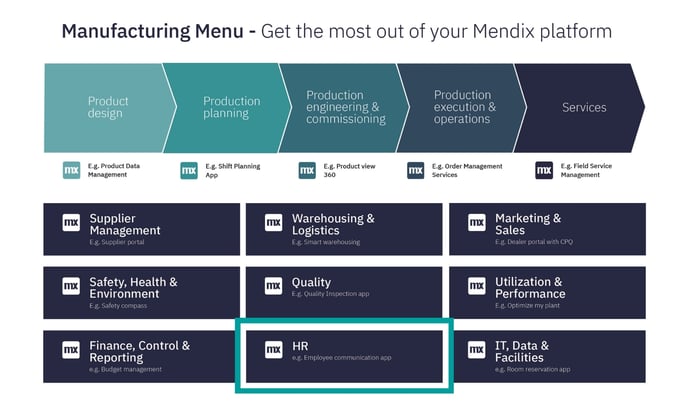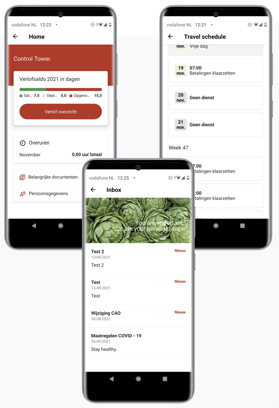Manufacturing Menu: Making the most of Human Capital with Modern HR Tools
Last edited on Apr, 17 2024 01:10:49 PM
Reading time: 6 minutes
Written by Chelsea Delich
Table of contents

Human capital is the engine that drives modern manufacturing. Of course, machines and technology play an important role, but as technology becomes more complex, you cannot do without the skilled people behind the buttons and on the shop floor. Soft skills are also important if you want to make your factory a well-oiled machine and achieve perfect interaction between the office and the shop floor.
About the Manufacturing Menu
Human Resources (HR) is therefore an area of focus that should not be missing from Emixa's manufacturing menu. In this article, you will learn more about the main HR challenges in the manufacturing industry and we will show you how an industry-specific HR solution can help you make even better use of your human capital.

This blog is part of the series: "Manufacturing Menu: Practical Solutions for the Manufacturing Industry" If you are also interested getting a grip on your cash flows with smart solutions for financial management, control and reporting, we invite you to read this blog as well. Discover more here.
HR and Manufacturing: The Challenges
The manufacturing industry is a specialized sector that often places specific and very particular demands on HR strategies and systems. It is time to take a look at the main HR challenges in the sector.
Diversity and Flexibility
Manufacturing is a very diverse sector. You will find international multinationals with operations in many countries, as well as SMEs producing mainly for the local market. A good HR solution that can be used across the sector therefore needs to be internationally deployable and offer a high level of usability and accessibility.
Different Roles and Employee Groups
A typical feature of many manufacturing organizations is that the roles and day-to-day activities of employees vary widely. You will find office workers, administrative staff, production workers, specialist technical staff, managers and sales and marketing staff. Work equipment for all these groups can also vary greatly, making it all the more important to ensure that data entry rights are always assigned to the right people.
Managing Permits and Certifications
Manufacturing companies must comply with a wide range of safety, quality and sustainability regulations and laws. In addition, employees are often required to take various training courses in order to perform their jobs. Regulations, standards and safety requirements can also vary from country to country. Properly documenting and maintaining approvals and certificates is a challenge, especially for companies that operate in a large number of countries.
Ensuring A Safe Working Environment
Safety is a constant concern in the manufacturing industry. Within the industry, employees sometimes work with hazardous substances or materials, as well as machines and production lines that need to be fine-tuned to ensure safety on the shop floor. This requires an HR system that allows you to match employees with the right certifications and training to specific tasks and production lines. At the same time, it is important that a manufacturing HR system allows you to document information about abnormal situations or near misses.
Good Planning and Induction
Many manufacturing companies operate on a 24/7 basis with shift work. In such an environment, it is important that the onboarding and scheduling of employees runs smoothly and that communication about schedules, working hours and shifts is clear, understandable to all parties and accessible anytime, anywhere.
Customer Case Aartsen: Complete, Flexible and Easy to Use Employee App
 For Aartsen, a large international importer of fresh fruit and vegetables, Emixa developed the 'employee app', an extremely versatile HR application that combines a variety of functionalities in one central solution and environment. Prior to the introduction of this app, communication within the company took place via different systems (mainly personal email addresses and the company newsletter), which were not optimally integrated. This made it difficult to communicate and plan properly, especially between different locations. Employees also lacked an enjoyable user experience.
For Aartsen, a large international importer of fresh fruit and vegetables, Emixa developed the 'employee app', an extremely versatile HR application that combines a variety of functionalities in one central solution and environment. Prior to the introduction of this app, communication within the company took place via different systems (mainly personal email addresses and the company newsletter), which were not optimally integrated. This made it difficult to communicate and plan properly, especially between different locations. Employees also lacked an enjoyable user experience.
The native mobile employee app acts as a central control room for all corporate communications in the office and on the shop floor. The smart solution houses a wide range of HR functionalities. Examples include
- Corporate communication
- Create and display rosters (shifts, times)
- Make and view schedule changes
- Request days off and holidays
- Access pay slips
- Register absences
- an intranet version with important company news ranging from collective bargaining to the latest production figures
The application is designed and built to be very easy for employees to use. Everyone is now kept up to date with the latest developments and news within the company, while the application has made it much easier for employees to reach colleagues. The HR team saves a lot of time by eliminating many tedious, time-consuming and error-prone manual processes.
Want to Take Your HR Policy to the Next Level?
A good HR strategy and a modern, future-proof HR application are the glue that binds communication, planning and compliance within your organization. Looking to give your HR policy a quality boost? Curious about how we leverage our knowledge of low-code, Mendix, digital twinning, plant simulation, and Siemens technology can help you with this? Feel free to contact us to explore the possibilities.
Last edited on Apr, 17 2024 01:10:49 PM
Reading time: 6 minutes
Written by Chelsea Delich
Also see..
OverviewManufacturing Menu: Give your Marketing and Sales a Quality Boost with a Modern Dealer Portal
What is the secret of B2B marketing and sales in the digital age? Personalization and strong...
Read more ⟶Manufacturing Menu: Get the most out of your Resources and Performance with the best tools for Utilization and Performance
Manufacturing companies operate in a challenging and dynamic marketplace. They face volatile...
Read more ⟶Manufacturing Menu: Building a Healthy & Safe Environment with the Right Technology
We live in an era where corporate social responsibility (CSR) holds a prominent place on the...
Read more ⟶

